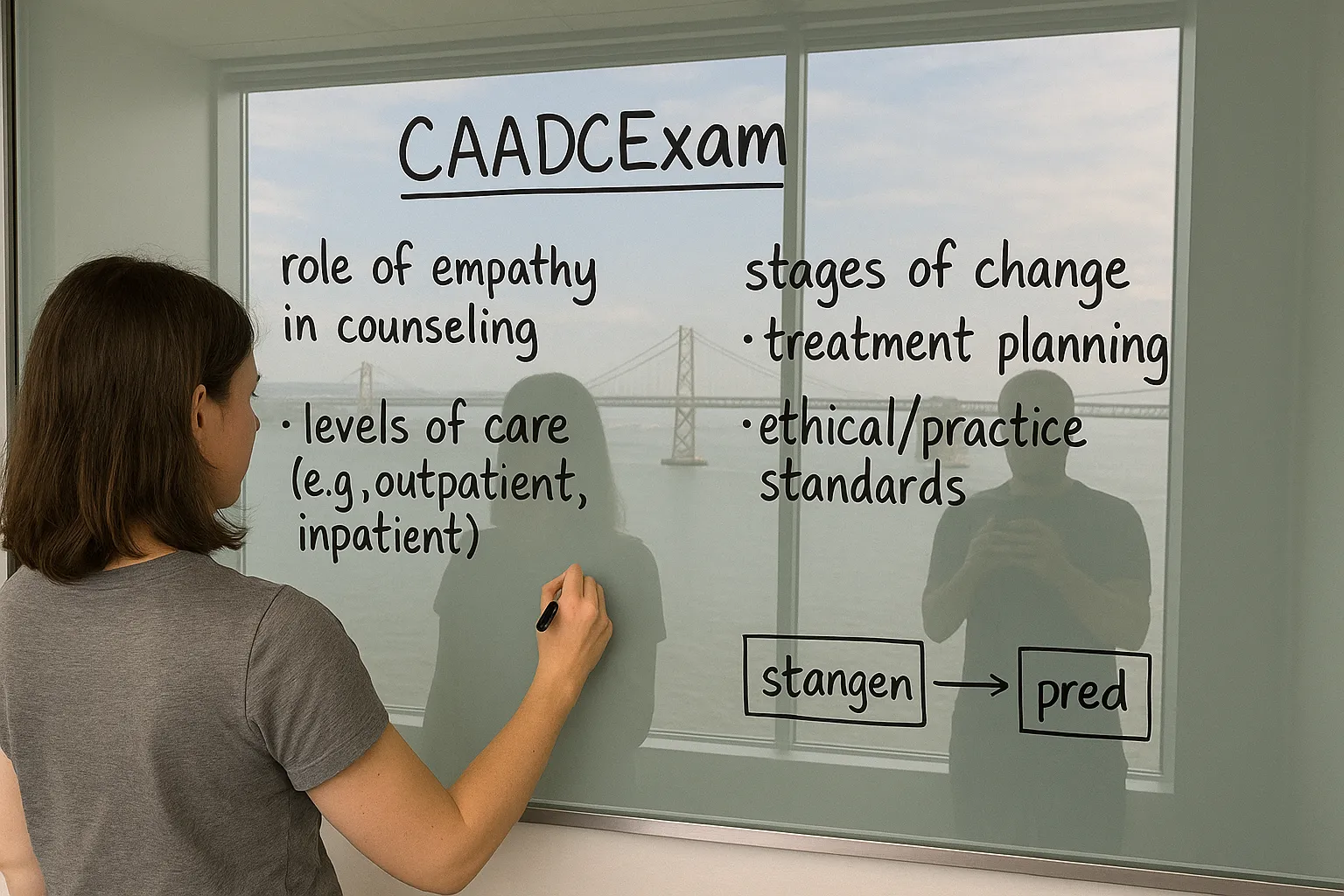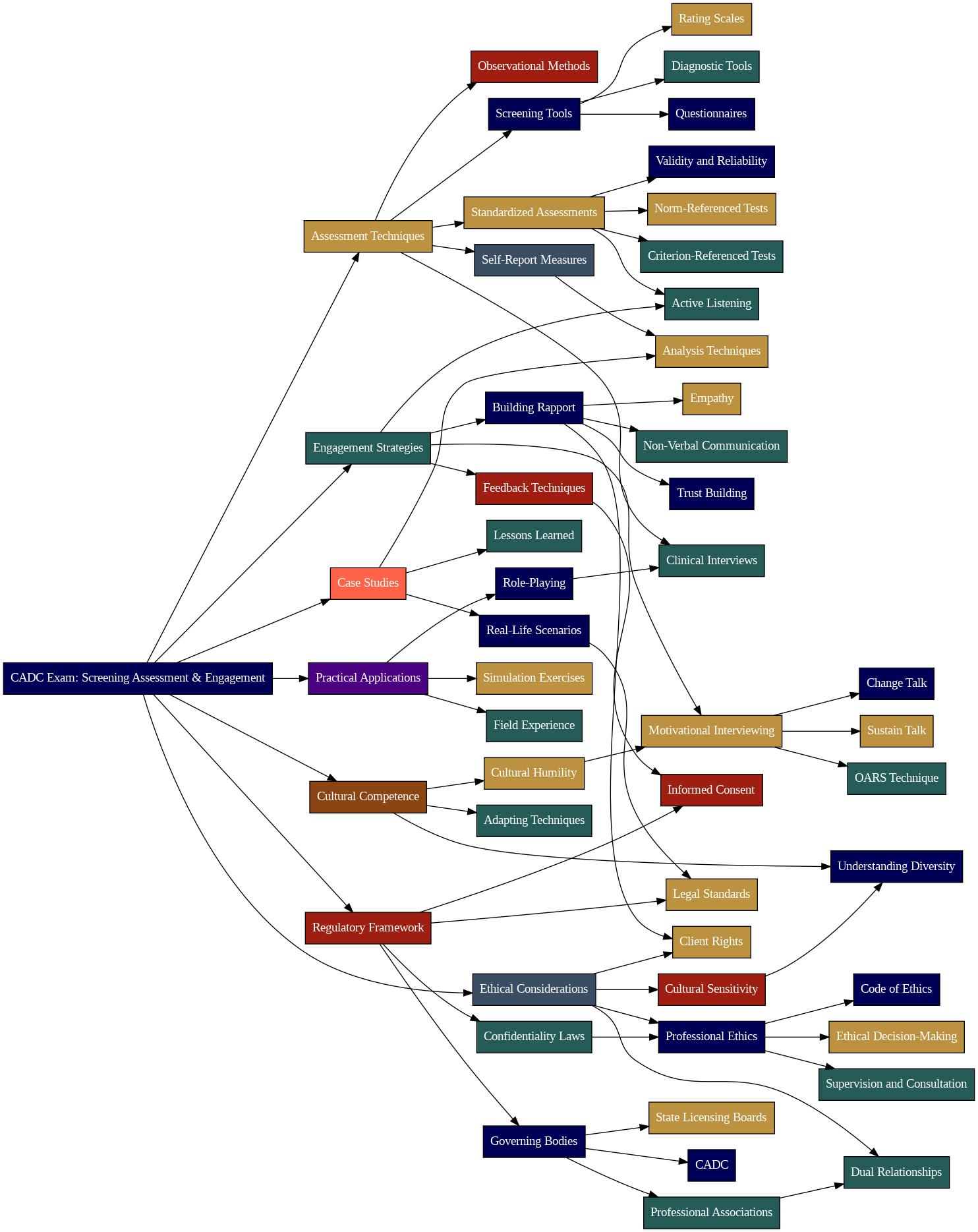Quiz-summary
0 of 30 questions completed
Questions:
- 1
- 2
- 3
- 4
- 5
- 6
- 7
- 8
- 9
- 10
- 11
- 12
- 13
- 14
- 15
- 16
- 17
- 18
- 19
- 20
- 21
- 22
- 23
- 24
- 25
- 26
- 27
- 28
- 29
- 30
Information
Premium Practice Questions
You have already completed the quiz before. Hence you can not start it again.
Quiz is loading...
You must sign in or sign up to start the quiz.
You have to finish following quiz, to start this quiz:
Results
0 of 30 questions answered correctly
Your time:
Time has elapsed
Categories
- Not categorized 0%
- 1
- 2
- 3
- 4
- 5
- 6
- 7
- 8
- 9
- 10
- 11
- 12
- 13
- 14
- 15
- 16
- 17
- 18
- 19
- 20
- 21
- 22
- 23
- 24
- 25
- 26
- 27
- 28
- 29
- 30
- Answered
- Review
-
Question 1 of 30
1. Question
A LISAC in Sierra Vista, Arizona, is working with a client who is struggling with alcohol addiction and has a history of domestic violence. During a session, the client reveals that they recently had a heated argument with their partner and felt an urge to become violent, but they managed to control themselves. The client’s partner is not present during the session. Which of the following actions should the LISAC prioritize, considering their ethical responsibilities?
Correct
In Arizona, as in most states, a substance abuse counselor’s primary ethical responsibility is to the client. This includes maintaining confidentiality, obtaining informed consent, avoiding dual relationships, and providing competent services. However, this responsibility is not absolute and can be superseded by legal and ethical obligations to protect the safety and well-being of others. The “duty to warn and protect,” as established in the Tarasoff case and subsequent legal interpretations, requires counselors to take reasonable steps to protect identifiable third parties from serious and imminent harm threatened by their clients. This duty overrides client confidentiality. Similarly, mandatory reporting laws require counselors to report suspected child abuse or neglect, as well as elder abuse or neglect, to the appropriate authorities. These laws also supersede client confidentiality. In situations where ethical obligations conflict, counselors should consult with supervisors, colleagues, or legal counsel to determine the most appropriate course of action. They should also document their decision-making process and the actions they take to resolve the conflict. The ultimate goal is to act in a manner that is consistent with ethical principles, legal requirements, and the best interests of all parties involved.
Incorrect
In Arizona, as in most states, a substance abuse counselor’s primary ethical responsibility is to the client. This includes maintaining confidentiality, obtaining informed consent, avoiding dual relationships, and providing competent services. However, this responsibility is not absolute and can be superseded by legal and ethical obligations to protect the safety and well-being of others. The “duty to warn and protect,” as established in the Tarasoff case and subsequent legal interpretations, requires counselors to take reasonable steps to protect identifiable third parties from serious and imminent harm threatened by their clients. This duty overrides client confidentiality. Similarly, mandatory reporting laws require counselors to report suspected child abuse or neglect, as well as elder abuse or neglect, to the appropriate authorities. These laws also supersede client confidentiality. In situations where ethical obligations conflict, counselors should consult with supervisors, colleagues, or legal counsel to determine the most appropriate course of action. They should also document their decision-making process and the actions they take to resolve the conflict. The ultimate goal is to act in a manner that is consistent with ethical principles, legal requirements, and the best interests of all parties involved.
-
Question 2 of 30
2. Question
Maria, a client in long-term substance abuse recovery, discloses to her LISAC in Arizona that she plans to commit insurance fraud to alleviate her mounting debt. According to Arizona law regarding confidentiality, what is the MOST appropriate course of action for the LISAC?
Correct
Arizona Revised Statutes (A.R.S.) § 32-3306 outlines the circumstances under which a Licensed Independent Substance Abuse Counselor (LISAC) may disclose confidential information without client consent. While client confidentiality is paramount, exceptions exist to protect individuals from harm. Specifically, A.R.S. § 32-3306(A)(2) permits disclosure if the counselor reasonably believes such disclosure is necessary to prevent the commission of a crime. However, this disclosure is limited to situations where the crime involves potential death or serious bodily harm. The counselor must have a reasonable basis for believing that the client intends to commit such a crime. In this scenario, Maria expressing intent to commit insurance fraud, while illegal, does not inherently involve death or serious bodily harm. Therefore, disclosing this information would violate confidentiality. Disclosing to prevent the commission of any crime is too broad and not aligned with the statute. Seeking legal consultation is prudent, but does not negate the immediate confidentiality concern. Filing a formal complaint is a potential avenue, but it does not address the immediate question of permissible disclosure.
Incorrect
Arizona Revised Statutes (A.R.S.) § 32-3306 outlines the circumstances under which a Licensed Independent Substance Abuse Counselor (LISAC) may disclose confidential information without client consent. While client confidentiality is paramount, exceptions exist to protect individuals from harm. Specifically, A.R.S. § 32-3306(A)(2) permits disclosure if the counselor reasonably believes such disclosure is necessary to prevent the commission of a crime. However, this disclosure is limited to situations where the crime involves potential death or serious bodily harm. The counselor must have a reasonable basis for believing that the client intends to commit such a crime. In this scenario, Maria expressing intent to commit insurance fraud, while illegal, does not inherently involve death or serious bodily harm. Therefore, disclosing this information would violate confidentiality. Disclosing to prevent the commission of any crime is too broad and not aligned with the statute. Seeking legal consultation is prudent, but does not negate the immediate confidentiality concern. Filing a formal complaint is a potential avenue, but it does not address the immediate question of permissible disclosure.
-
Question 3 of 30
3. Question
During a counseling session in Phoenix, Arizona, an LISAC, Jamila, learns that her client, a 70-year-old woman with cognitive impairment, is being financially exploited by her caregiver. The client discloses that the caregiver is using her bank card for personal expenses without her consent. While the client expresses fear of losing her caregiver, Jamila suspects ongoing abuse. According to Arizona law and ethical guidelines for LISACs, what is Jamila’s most appropriate course of action?
Correct
Arizona Revised Statutes (A.R.S.) § 32-3305(A)(1) mandates reporting suspected abuse, neglect, or exploitation of a vulnerable adult. A vulnerable adult is defined as someone 18 years or older who is unable to protect themselves from abuse, neglect, or exploitation due to physical or mental impairment. The LISAC’s primary responsibility is to ensure the safety and well-being of the vulnerable adult. While encouraging self-advocacy and providing resources are important, they do not supersede the legal obligation to report. Consulting with a supervisor or legal counsel is a prudent step, but it does not absolve the LISAC of their mandatory reporting duty. Delaying the report while gathering additional information could expose the vulnerable adult to further harm and violate the statute. Therefore, the immediate and direct action of reporting the suspected abuse to the appropriate authorities is the most ethical and legally compliant response. The definition of “abuse” includes physical harm, neglect, emotional harm, sexual abuse, or financial exploitation. The LISAC must also be aware of the reporting procedures and timelines outlined in A.R.S. § 46-451, which requires immediate reporting upon reasonable cause to believe that a vulnerable adult has been subjected to abuse, neglect, or exploitation. Failing to report constitutes a misdemeanor offense in Arizona.
Incorrect
Arizona Revised Statutes (A.R.S.) § 32-3305(A)(1) mandates reporting suspected abuse, neglect, or exploitation of a vulnerable adult. A vulnerable adult is defined as someone 18 years or older who is unable to protect themselves from abuse, neglect, or exploitation due to physical or mental impairment. The LISAC’s primary responsibility is to ensure the safety and well-being of the vulnerable adult. While encouraging self-advocacy and providing resources are important, they do not supersede the legal obligation to report. Consulting with a supervisor or legal counsel is a prudent step, but it does not absolve the LISAC of their mandatory reporting duty. Delaying the report while gathering additional information could expose the vulnerable adult to further harm and violate the statute. Therefore, the immediate and direct action of reporting the suspected abuse to the appropriate authorities is the most ethical and legally compliant response. The definition of “abuse” includes physical harm, neglect, emotional harm, sexual abuse, or financial exploitation. The LISAC must also be aware of the reporting procedures and timelines outlined in A.R.S. § 46-451, which requires immediate reporting upon reasonable cause to believe that a vulnerable adult has been subjected to abuse, neglect, or exploitation. Failing to report constitutes a misdemeanor offense in Arizona.
-
Question 4 of 30
4. Question
An Arizona LISAC, Javier, is working with a 70-year-old client, Maria, who is receiving treatment for alcohol use disorder. Maria discloses that her adult son, with whom she lives, has been taking her social security checks and leaving her with little money for food or necessities. Maria seems fearful of her son and hesitant to report him. According to Arizona law regarding vulnerable adults, what is Javier’s ethical and legal obligation?
Correct
According to Arizona Revised Statutes (A.R.S.) § 32-3304, a Licensed Independent Substance Abuse Counselor (LISAC) has a duty to report suspected abuse, neglect, or exploitation of a vulnerable adult. A vulnerable adult is defined as a person eighteen years or older who is unable to protect themselves from abuse, neglect, or exploitation due to physical or mental impairment. This duty arises when the LISAC has a reasonable basis to believe such abuse, neglect, or exploitation has occurred. The report must be made to the Arizona Department of Economic Security (ADES) or a local law enforcement agency. The statute emphasizes protecting vulnerable individuals who may be unable to advocate for themselves. Failing to report suspected abuse, neglect, or exploitation can result in legal consequences for the LISAC, including potential disciplinary action by the Arizona Board of Behavioral Health Examiners. It is crucial for LISACs to be aware of the indicators of abuse, neglect, or exploitation and to follow the proper reporting procedures to ensure the safety and well-being of vulnerable adults. The ethical obligation reinforces the legal mandate, requiring counselors to prioritize the welfare of vulnerable clients. The duty to report supersedes confidentiality in situations where a vulnerable adult’s safety is at risk.
Incorrect
According to Arizona Revised Statutes (A.R.S.) § 32-3304, a Licensed Independent Substance Abuse Counselor (LISAC) has a duty to report suspected abuse, neglect, or exploitation of a vulnerable adult. A vulnerable adult is defined as a person eighteen years or older who is unable to protect themselves from abuse, neglect, or exploitation due to physical or mental impairment. This duty arises when the LISAC has a reasonable basis to believe such abuse, neglect, or exploitation has occurred. The report must be made to the Arizona Department of Economic Security (ADES) or a local law enforcement agency. The statute emphasizes protecting vulnerable individuals who may be unable to advocate for themselves. Failing to report suspected abuse, neglect, or exploitation can result in legal consequences for the LISAC, including potential disciplinary action by the Arizona Board of Behavioral Health Examiners. It is crucial for LISACs to be aware of the indicators of abuse, neglect, or exploitation and to follow the proper reporting procedures to ensure the safety and well-being of vulnerable adults. The ethical obligation reinforces the legal mandate, requiring counselors to prioritize the welfare of vulnerable clients. The duty to report supersedes confidentiality in situations where a vulnerable adult’s safety is at risk.
-
Question 5 of 30
5. Question
An LISAC in Arizona is approached by a close friend who is seeking counseling for alcohol use disorder. The friend is aware of the LISAC’s expertise in substance abuse treatment and is eager to work with them. According to ethical guidelines for LISACs, what is the MOST appropriate course of action for the counselor?
Correct
The scenario involves a dual relationship, which is ethically problematic in counseling. According to the ACA Code of Ethics and the ethical guidelines for LISACs in Arizona, dual relationships occur when a counselor has a relationship with a client outside of the professional counseling context. Such relationships can impair the counselor’s objectivity, competence, or effectiveness and can harm the client. Accepting a client who is also a close friend creates a conflict of interest and compromises professional boundaries. The counselor’s judgment may be clouded by the existing friendship, and the client may not feel comfortable being fully honest in therapy. Referring the friend to another qualified professional is the most ethical course of action.
Incorrect
The scenario involves a dual relationship, which is ethically problematic in counseling. According to the ACA Code of Ethics and the ethical guidelines for LISACs in Arizona, dual relationships occur when a counselor has a relationship with a client outside of the professional counseling context. Such relationships can impair the counselor’s objectivity, competence, or effectiveness and can harm the client. Accepting a client who is also a close friend creates a conflict of interest and compromises professional boundaries. The counselor’s judgment may be clouded by the existing friendship, and the client may not feel comfortable being fully honest in therapy. Referring the friend to another qualified professional is the most ethical course of action.
-
Question 6 of 30
6. Question
A LISAC in Arizona is facing financial difficulties and is tempted to bill insurance companies for group therapy sessions that were not actually conducted. What is the MOST ethically and legally sound course of action for the LISAC to take?
Correct
According to Arizona Administrative Code R4-6-208, LISACs are required to maintain accurate and truthful records of services provided to clients. This includes documenting the dates of service, types of interventions used, client progress, and any significant events or incidents that occur during treatment. Falsifying records, such as billing for services not rendered or misrepresenting the client’s diagnosis, is a violation of ethical and legal standards and can result in disciplinary action by the Arizona Board of Behavioral Health Examiners. Accurate record-keeping is essential for ensuring continuity of care, providing evidence of services for billing purposes, and protecting the counselor from liability.
Incorrect
According to Arizona Administrative Code R4-6-208, LISACs are required to maintain accurate and truthful records of services provided to clients. This includes documenting the dates of service, types of interventions used, client progress, and any significant events or incidents that occur during treatment. Falsifying records, such as billing for services not rendered or misrepresenting the client’s diagnosis, is a violation of ethical and legal standards and can result in disciplinary action by the Arizona Board of Behavioral Health Examiners. Accurate record-keeping is essential for ensuring continuity of care, providing evidence of services for billing purposes, and protecting the counselor from liability.
-
Question 7 of 30
7. Question
A LISAC in Arizona is treating a client, Benicio, for opioid use disorder. During a session, Benicio expresses anger towards his former employer, stating, “I’m so mad, I could just go down there and punch him in the face.” While Benicio has a history of impulsive behavior, he has never been physically violent. Under what circumstances would the LISAC have a legal *duty to warn* Benicio’s former employer, according to Arizona law?
Correct
Arizona Revised Statutes (A.R.S.) § 32-3306 outlines the specific conditions under which a LISAC (Licensed Independent Substance Abuse Counselor) in Arizona is legally obligated to breach client confidentiality. The “duty to warn and protect” arises when a client presents a clear and imminent danger to themselves or others. This duty is further clarified and interpreted through case law and ethical guidelines provided by the Arizona Board of Behavioral Health Examiners. The key factors in determining the obligation include the credibility and immediacy of the threat. A vague or unsubstantiated concern does not trigger the duty. The counselor must have a reasonable belief, based on the client’s statements or behavior, that the client poses a significant risk. Additionally, the counselor must make reasonable efforts to assess the credibility of the threat and, if credible, take steps to protect the intended victim or the client themselves. These steps can include notifying the potential victim, contacting law enforcement, or initiating involuntary commitment proceedings if appropriate. The counselor’s actions must be documented thoroughly, demonstrating the rationale for the breach of confidentiality and the steps taken to mitigate the risk. It is crucial to understand that breaching confidentiality without a clear and imminent threat could expose the counselor to legal and ethical repercussions.
Incorrect
Arizona Revised Statutes (A.R.S.) § 32-3306 outlines the specific conditions under which a LISAC (Licensed Independent Substance Abuse Counselor) in Arizona is legally obligated to breach client confidentiality. The “duty to warn and protect” arises when a client presents a clear and imminent danger to themselves or others. This duty is further clarified and interpreted through case law and ethical guidelines provided by the Arizona Board of Behavioral Health Examiners. The key factors in determining the obligation include the credibility and immediacy of the threat. A vague or unsubstantiated concern does not trigger the duty. The counselor must have a reasonable belief, based on the client’s statements or behavior, that the client poses a significant risk. Additionally, the counselor must make reasonable efforts to assess the credibility of the threat and, if credible, take steps to protect the intended victim or the client themselves. These steps can include notifying the potential victim, contacting law enforcement, or initiating involuntary commitment proceedings if appropriate. The counselor’s actions must be documented thoroughly, demonstrating the rationale for the breach of confidentiality and the steps taken to mitigate the risk. It is crucial to understand that breaching confidentiality without a clear and imminent threat could expose the counselor to legal and ethical repercussions.
-
Question 8 of 30
8. Question
A LISAC in Arizona, Javier, is working with a 70-year-old client, Maria, who has a history of alcohol abuse and cognitive decline. During a session, Maria discloses that her son, who lives with her and manages her finances, often withholds food and medication if she doesn’t comply with his demands. Javier observes that Maria appears malnourished and confused. According to Arizona law regarding the duty to report, what is Javier’s ethical and legal obligation?
Correct
According to Arizona Revised Statutes (A.R.S.) § 32-3305, a Licensed Independent Substance Abuse Counselor (LISAC) has a duty to report suspected abuse, neglect, or exploitation of a vulnerable adult. A vulnerable adult is defined as a person eighteen years or older who is unable to protect themselves from abuse, neglect, or exploitation by others due to physical or mental impairment. The LISAC’s duty to report is triggered when, in their professional capacity, they have a reasonable basis to believe that such abuse, neglect, or exploitation has occurred or is occurring. The report must be made to the Arizona Department of Economic Security (DES) or a local law enforcement agency. Failure to report can result in civil and criminal penalties. The LISAC is not required to conduct an investigation but must report based on the information available to them at the time. The statute aims to protect vulnerable adults by ensuring that professionals who interact with them are mandated to report any suspected maltreatment, allowing for timely intervention and protection. The key is the reasonable basis to believe, which requires professional judgment based on observed facts and circumstances.
Incorrect
According to Arizona Revised Statutes (A.R.S.) § 32-3305, a Licensed Independent Substance Abuse Counselor (LISAC) has a duty to report suspected abuse, neglect, or exploitation of a vulnerable adult. A vulnerable adult is defined as a person eighteen years or older who is unable to protect themselves from abuse, neglect, or exploitation by others due to physical or mental impairment. The LISAC’s duty to report is triggered when, in their professional capacity, they have a reasonable basis to believe that such abuse, neglect, or exploitation has occurred or is occurring. The report must be made to the Arizona Department of Economic Security (DES) or a local law enforcement agency. Failure to report can result in civil and criminal penalties. The LISAC is not required to conduct an investigation but must report based on the information available to them at the time. The statute aims to protect vulnerable adults by ensuring that professionals who interact with them are mandated to report any suspected maltreatment, allowing for timely intervention and protection. The key is the reasonable basis to believe, which requires professional judgment based on observed facts and circumstances.
-
Question 9 of 30
9. Question
According to Arizona state law and professional ethical guidelines for LISACs, how long must a Licensed Independent Substance Abuse Counselor maintain client records after the last date of professional service, and what is the primary consideration when destroying these records?
Correct
Arizona Revised Statutes (A.R.S.) § 32-3306 outlines the requirements for client records maintenance by behavioral health professionals, including LISACs. It mandates that records be maintained for at least six years after the last date of service to the client. This requirement ensures continuity of care, provides a basis for accountability, and allows for potential legal or ethical reviews. Destruction of records must be performed in a manner that protects client confidentiality, such as shredding or secure electronic deletion. The Arizona Board of Behavioral Health Examiners provides further guidance on record keeping and destruction to ensure compliance with ethical and legal standards. Furthermore, HIPAA (Health Insurance Portability and Accountability Act) sets federal standards for privacy and security of protected health information, which must be adhered to in conjunction with Arizona state laws. The intersection of state and federal laws requires that LISACs understand and comply with the stricter of the two when there are differences. In this case, Arizona law dictates the minimum retention period, while HIPAA provides the framework for protecting the confidentiality and security of the information contained within those records. The duty to protect client confidentiality extends beyond the termination of services and requires careful planning for record retention and destruction.
Incorrect
Arizona Revised Statutes (A.R.S.) § 32-3306 outlines the requirements for client records maintenance by behavioral health professionals, including LISACs. It mandates that records be maintained for at least six years after the last date of service to the client. This requirement ensures continuity of care, provides a basis for accountability, and allows for potential legal or ethical reviews. Destruction of records must be performed in a manner that protects client confidentiality, such as shredding or secure electronic deletion. The Arizona Board of Behavioral Health Examiners provides further guidance on record keeping and destruction to ensure compliance with ethical and legal standards. Furthermore, HIPAA (Health Insurance Portability and Accountability Act) sets federal standards for privacy and security of protected health information, which must be adhered to in conjunction with Arizona state laws. The intersection of state and federal laws requires that LISACs understand and comply with the stricter of the two when there are differences. In this case, Arizona law dictates the minimum retention period, while HIPAA provides the framework for protecting the confidentiality and security of the information contained within those records. The duty to protect client confidentiality extends beyond the termination of services and requires careful planning for record retention and destruction.
-
Question 10 of 30
10. Question
A Licensed Independent Substance Abuse Counselor (LISAC) in Arizona is working with a client, Javier, who has a history of volatile behavior. During a session, Javier expresses anger towards his former supervisor, stating, “I’m so angry I could just explode.” Javier doesn’t explicitly threaten his supervisor but alludes to past conflicts. Which of the following actions BEST describes the LISAC’s legal obligation regarding duty to warn and protect under Arizona law?
Correct
Arizona Revised Statutes (A.R.S.) § 32-3306 outlines the specific circumstances under which a LISAC has a duty to warn and protect. It’s not a blanket requirement to report any suspicion of harm, but rather it’s triggered when a client makes a credible threat to inflict serious bodily harm upon a reasonably identifiable victim. The statute aims to balance client confidentiality with public safety. The LISAC must have reasonable cause to believe the client’s threat is genuine and imminent. This requires a careful assessment of the client’s history, current mental state, and the specifics of the threat. The duty is discharged by taking reasonable precautions, which may include notifying the intended victim, notifying law enforcement, or taking other steps to prevent the threatened harm. Simply documenting the threat in the client’s file, while important for record-keeping, does not fulfill the duty to warn and protect. The LISAC is not obligated to predict future behavior, but rather to respond appropriately to credible and imminent threats.
Incorrect
Arizona Revised Statutes (A.R.S.) § 32-3306 outlines the specific circumstances under which a LISAC has a duty to warn and protect. It’s not a blanket requirement to report any suspicion of harm, but rather it’s triggered when a client makes a credible threat to inflict serious bodily harm upon a reasonably identifiable victim. The statute aims to balance client confidentiality with public safety. The LISAC must have reasonable cause to believe the client’s threat is genuine and imminent. This requires a careful assessment of the client’s history, current mental state, and the specifics of the threat. The duty is discharged by taking reasonable precautions, which may include notifying the intended victim, notifying law enforcement, or taking other steps to prevent the threatened harm. Simply documenting the threat in the client’s file, while important for record-keeping, does not fulfill the duty to warn and protect. The LISAC is not obligated to predict future behavior, but rather to respond appropriately to credible and imminent threats.
-
Question 11 of 30
11. Question
A LISAC in Arizona is treating a client with a history of opioid use disorder. The client relapses and admits to using heroin. Which of the following scenarios would legally compel the LISAC to breach client confidentiality under Arizona law?
Correct
Arizona Revised Statutes (A.R.S.) § 32-3306 outlines specific exceptions to client confidentiality for Licensed Independent Substance Abuse Counselors (LISACs). While general client information is protected, there are legally mandated circumstances where disclosure is required. These include instances of suspected child abuse or neglect, as mandated reporters are legally obligated to report such concerns to the appropriate authorities (Department of Child Safety). Similarly, if a client presents a clear and imminent danger to themselves or others, the duty to warn and protect overrides confidentiality. Court orders also compel disclosure. Simply having a client relapse, while a serious clinical concern, does not automatically trigger a breach of confidentiality unless it directly leads to one of the aforementioned mandated reporting situations (e.g., relapse leading to neglect of a child). While consultation with supervisors is ethically sound and often legally prudent, it doesn’t constitute a breach of confidentiality if the client’s identifying information is appropriately protected and the consultation is for the purpose of improving client care. The Health Insurance Portability and Accountability Act (HIPAA) also provides guidance on what information can be shared and when.
Incorrect
Arizona Revised Statutes (A.R.S.) § 32-3306 outlines specific exceptions to client confidentiality for Licensed Independent Substance Abuse Counselors (LISACs). While general client information is protected, there are legally mandated circumstances where disclosure is required. These include instances of suspected child abuse or neglect, as mandated reporters are legally obligated to report such concerns to the appropriate authorities (Department of Child Safety). Similarly, if a client presents a clear and imminent danger to themselves or others, the duty to warn and protect overrides confidentiality. Court orders also compel disclosure. Simply having a client relapse, while a serious clinical concern, does not automatically trigger a breach of confidentiality unless it directly leads to one of the aforementioned mandated reporting situations (e.g., relapse leading to neglect of a child). While consultation with supervisors is ethically sound and often legally prudent, it doesn’t constitute a breach of confidentiality if the client’s identifying information is appropriately protected and the consultation is for the purpose of improving client care. The Health Insurance Portability and Accountability Act (HIPAA) also provides guidance on what information can be shared and when.
-
Question 12 of 30
12. Question
Jamal, an Arizona LISAC, overhears a colleague, Dr. Anya Sharma, making repeated disparaging remarks about a client’s cultural background during a staff meeting. Jamal also witnesses Dr. Sharma consistently scheduling shorter sessions with clients from that same cultural group. According to Arizona statutes regarding mandatory reporting, what is Jamal’s ethical and legal responsibility?
Correct
Arizona Revised Statutes (A.R.S.) § 32-3306 outlines the requirements for reporting unprofessional conduct by licensed professionals, including LISACs. This statute mandates reporting when a licensee has direct knowledge of a colleague engaging in behavior that violates the ethical or legal standards of the profession, particularly if it could potentially harm clients or the public. The key element here is “direct knowledge,” meaning firsthand observation or reliable information that leaves no reasonable doubt about the misconduct. The reporting obligation is designed to ensure accountability and protect the welfare of clients and the integrity of the profession. Failing to report such conduct can itself be considered a violation of ethical standards, as it undermines the self-regulation mechanisms of the profession. The LISAC must assess the credibility of the information and the potential harm involved before deciding whether to report, balancing the duty to protect clients with the need to avoid false accusations. The Arizona Board of Behavioral Health Examiners provides guidance on interpreting and applying these reporting requirements.
Incorrect
Arizona Revised Statutes (A.R.S.) § 32-3306 outlines the requirements for reporting unprofessional conduct by licensed professionals, including LISACs. This statute mandates reporting when a licensee has direct knowledge of a colleague engaging in behavior that violates the ethical or legal standards of the profession, particularly if it could potentially harm clients or the public. The key element here is “direct knowledge,” meaning firsthand observation or reliable information that leaves no reasonable doubt about the misconduct. The reporting obligation is designed to ensure accountability and protect the welfare of clients and the integrity of the profession. Failing to report such conduct can itself be considered a violation of ethical standards, as it undermines the self-regulation mechanisms of the profession. The LISAC must assess the credibility of the information and the potential harm involved before deciding whether to report, balancing the duty to protect clients with the need to avoid false accusations. The Arizona Board of Behavioral Health Examiners provides guidance on interpreting and applying these reporting requirements.
-
Question 13 of 30
13. Question
A Licensed Independent Substance Abuse Counselor (LISAC) in Arizona is working with a client, Maria, who is a single mother struggling with opioid addiction. During a session, Maria admits to occasionally leaving her 6-year-old child home alone for short periods while she runs out to obtain drugs. Maria expresses remorse and a desire to change but fears that involving child protective services will result in her losing custody of her child. Considering Arizona-specific laws and ethical guidelines for LISACs, what is the MOST ethically sound course of action for the LISAC?
Correct
In Arizona, LISACs face unique ethical challenges when dealing with clients who are parents and are struggling with substance use disorders. Arizona Revised Statutes (A.R.S.) § 8-803 mandates reporting instances of child abuse or neglect. This intersects with confidentiality requirements under HIPAA and 42 CFR Part 2, which protect client information related to substance use treatment. The critical ethical decision involves balancing the duty to protect a child’s welfare with the client’s right to privacy and the potential impact of reporting on the therapeutic relationship. The LISAC must first thoroughly assess the situation. This includes gathering information about the parent’s substance use, the child’s living environment, and any direct evidence of harm or risk of harm to the child. If there is reasonable cause to believe a child is being abused or neglected, the LISAC is legally obligated to report this to the Arizona Department of Child Safety (DCS). However, before making a report, the LISAC should, if possible, discuss the concerns with the client, explain the mandatory reporting requirements, and explore ways to mitigate the risk to the child collaboratively. The LISAC should also consult with a supervisor or ethics committee to ensure they are making the most ethical and legally sound decision. Documenting the assessment process, the rationale for the decision, and any consultations is crucial. Even if a report is not made, the LISAC must continue to monitor the situation and provide support to the parent to improve their parenting skills and reduce the risk to the child. The goal is to protect the child while also supporting the parent’s recovery journey. This requires a delicate balance of legal obligations, ethical considerations, and clinical judgment.
Incorrect
In Arizona, LISACs face unique ethical challenges when dealing with clients who are parents and are struggling with substance use disorders. Arizona Revised Statutes (A.R.S.) § 8-803 mandates reporting instances of child abuse or neglect. This intersects with confidentiality requirements under HIPAA and 42 CFR Part 2, which protect client information related to substance use treatment. The critical ethical decision involves balancing the duty to protect a child’s welfare with the client’s right to privacy and the potential impact of reporting on the therapeutic relationship. The LISAC must first thoroughly assess the situation. This includes gathering information about the parent’s substance use, the child’s living environment, and any direct evidence of harm or risk of harm to the child. If there is reasonable cause to believe a child is being abused or neglected, the LISAC is legally obligated to report this to the Arizona Department of Child Safety (DCS). However, before making a report, the LISAC should, if possible, discuss the concerns with the client, explain the mandatory reporting requirements, and explore ways to mitigate the risk to the child collaboratively. The LISAC should also consult with a supervisor or ethics committee to ensure they are making the most ethical and legally sound decision. Documenting the assessment process, the rationale for the decision, and any consultations is crucial. Even if a report is not made, the LISAC must continue to monitor the situation and provide support to the parent to improve their parenting skills and reduce the risk to the child. The goal is to protect the child while also supporting the parent’s recovery journey. This requires a delicate balance of legal obligations, ethical considerations, and clinical judgment.
-
Question 14 of 30
14. Question
An Arizona LISAC, while transitioning to a new electronic health record (EHR) system, discovers that the previous system’s data retention policy was only five years. A client from six years ago requests their complete treatment record. According to Arizona Revised Statutes (A.R.S.) § 32-3305 regarding client records, what is the LISAC’s legal obligation?
Correct
Arizona Revised Statutes (A.R.S.) § 32-3305 outlines the specific requirements for client records maintenance for licensed behavioral health professionals, including LISACs. It mandates that records be maintained in a secure manner for at least six years following the last date of service. This statute is in place to ensure continuity of care, provide a legal record of services, and allow for audits or investigations if necessary. The record must include identifying information, dates of service, types of services provided, assessment data, treatment plans, progress notes, and any correspondence related to the client’s treatment. The statute also emphasizes the need for confidentiality and security of these records, including electronic health records, to protect client privacy. Failure to comply with these requirements could result in disciplinary action by the Arizona Board of Behavioral Health Examiners. Understanding this statute is crucial for LISACs to maintain ethical and legal compliance in their practice.
Incorrect
Arizona Revised Statutes (A.R.S.) § 32-3305 outlines the specific requirements for client records maintenance for licensed behavioral health professionals, including LISACs. It mandates that records be maintained in a secure manner for at least six years following the last date of service. This statute is in place to ensure continuity of care, provide a legal record of services, and allow for audits or investigations if necessary. The record must include identifying information, dates of service, types of services provided, assessment data, treatment plans, progress notes, and any correspondence related to the client’s treatment. The statute also emphasizes the need for confidentiality and security of these records, including electronic health records, to protect client privacy. Failure to comply with these requirements could result in disciplinary action by the Arizona Board of Behavioral Health Examiners. Understanding this statute is crucial for LISACs to maintain ethical and legal compliance in their practice.
-
Question 15 of 30
15. Question
An Arizona LISAC, Maria, last provided counseling services to a client when the client was 16 years old. According to Arizona state law and professional ethical guidelines regarding record retention for behavioral health professionals, until what age must Maria retain this client’s records?
Correct
Arizona Revised Statutes (A.R.S.) § 32-3305 outlines the specific requirements for client records maintenance by licensed behavioral health professionals, including LISACs. These records must be kept for a minimum of six years following the last date of service to the client. The records must be maintained in a secure manner to protect client confidentiality. Exceptions exist, such as when a client is a minor, in which case the records must be kept until the client reaches the age of majority plus six years. HIPAA regulations also play a significant role, requiring covered entities, including many LISAC practices, to maintain records in a secure manner and provide clients with access to their records. Furthermore, ethical guidelines from organizations like the NAADAC (the Association for Addiction Professionals) also emphasize the importance of proper record-keeping and confidentiality. These standards are put in place to ensure accountability, continuity of care, and protection of client rights. The specific scenario described involves a client who was seen for services until they were 16 years old. Therefore, the records must be kept until the client reaches the age of majority (18 in Arizona) plus six years, totaling 24 years of age.
Incorrect
Arizona Revised Statutes (A.R.S.) § 32-3305 outlines the specific requirements for client records maintenance by licensed behavioral health professionals, including LISACs. These records must be kept for a minimum of six years following the last date of service to the client. The records must be maintained in a secure manner to protect client confidentiality. Exceptions exist, such as when a client is a minor, in which case the records must be kept until the client reaches the age of majority plus six years. HIPAA regulations also play a significant role, requiring covered entities, including many LISAC practices, to maintain records in a secure manner and provide clients with access to their records. Furthermore, ethical guidelines from organizations like the NAADAC (the Association for Addiction Professionals) also emphasize the importance of proper record-keeping and confidentiality. These standards are put in place to ensure accountability, continuity of care, and protection of client rights. The specific scenario described involves a client who was seen for services until they were 16 years old. Therefore, the records must be kept until the client reaches the age of majority (18 in Arizona) plus six years, totaling 24 years of age.
-
Question 16 of 30
16. Question
Sixteen-year-old Maria, residing in Arizona, independently seeks substance abuse counseling from a LISAC. She meets the criteria for independent consent according to A.R.S. § 32-3283. Maria explicitly requests that her treatment information not be shared with her parents. Under what specific conditions, according to Arizona statutes and ethical guidelines for LISACs, would the LISAC be ethically and legally justified in disclosing Maria’s treatment information to her parents without her consent?
Correct
In Arizona, LISACs must adhere to specific regulations regarding client confidentiality, particularly when dealing with minors. Arizona Revised Statutes (A.R.S.) § 32-3283 outlines the circumstances under which a minor can consent to mental health services, including substance abuse treatment, without parental consent. Generally, minors aged 12 and older can consent to outpatient mental health services if the professional determines the minor is mature enough to understand the nature and consequences of the proposed treatment. However, this does not automatically grant the LISAC the right to disclose treatment information to the minor’s parents. A.R.S. § 12-2295 governs the confidentiality of health care information, and while it allows for some exceptions, the LISAC must prioritize the minor’s privacy rights, especially if the minor has legally consented to treatment. The LISAC should engage in a discussion with the minor to explore their reasons for wanting to keep the information confidential and to assess the potential risks and benefits of disclosure versus non-disclosure. If the minor is at risk of harm or is causing harm to others, the duty to warn and protect may override confidentiality. Consultation with a supervisor or legal counsel is recommended to navigate this complex ethical and legal situation, ensuring compliance with Arizona law and ethical standards for LISACs. The ultimate decision should be based on the best interests of the minor, balancing their autonomy with their safety and well-being.
Incorrect
In Arizona, LISACs must adhere to specific regulations regarding client confidentiality, particularly when dealing with minors. Arizona Revised Statutes (A.R.S.) § 32-3283 outlines the circumstances under which a minor can consent to mental health services, including substance abuse treatment, without parental consent. Generally, minors aged 12 and older can consent to outpatient mental health services if the professional determines the minor is mature enough to understand the nature and consequences of the proposed treatment. However, this does not automatically grant the LISAC the right to disclose treatment information to the minor’s parents. A.R.S. § 12-2295 governs the confidentiality of health care information, and while it allows for some exceptions, the LISAC must prioritize the minor’s privacy rights, especially if the minor has legally consented to treatment. The LISAC should engage in a discussion with the minor to explore their reasons for wanting to keep the information confidential and to assess the potential risks and benefits of disclosure versus non-disclosure. If the minor is at risk of harm or is causing harm to others, the duty to warn and protect may override confidentiality. Consultation with a supervisor or legal counsel is recommended to navigate this complex ethical and legal situation, ensuring compliance with Arizona law and ethical standards for LISACs. The ultimate decision should be based on the best interests of the minor, balancing their autonomy with their safety and well-being.
-
Question 17 of 30
17. Question
A LISAC in Arizona is providing counseling to a client who discloses that their sister, a vulnerable adult with cognitive impairments, is being financially exploited by her caregiver. The client states that the caregiver has been using the sister’s social security checks for personal expenses and neglecting her basic needs. According to Arizona law and ethical guidelines, what is the LISAC’s MOST appropriate course of action?
Correct
According to Arizona Revised Statutes (A.R.S.) § 32-3305, LISACs have a duty to report suspected abuse, neglect, or exploitation of vulnerable adults. This duty arises when the LISAC, in their professional capacity, has a reasonable basis to believe that a vulnerable adult is being subjected to abuse, neglect, or exploitation. The law requires reporting to the Arizona Department of Economic Security (DES) or law enforcement. The LISAC must make this report immediately or as soon as practically possible, typically within 24 hours, to ensure the vulnerable adult’s safety. Failing to report can result in legal consequences for the LISAC. In this scenario, the client’s sister, who is a vulnerable adult, is exhibiting signs of financial exploitation by her caregiver. This situation triggers the LISAC’s mandatory reporting duty under Arizona law. Therefore, the LISAC must report the suspected exploitation to the appropriate authorities, namely the Arizona Department of Economic Security (DES) or law enforcement. The LISAC’s ethical obligations are intertwined with these legal requirements, necessitating immediate action to protect the vulnerable adult from further harm. Documenting the report and consulting with a supervisor are also important steps to ensure ethical and legal compliance.
Incorrect
According to Arizona Revised Statutes (A.R.S.) § 32-3305, LISACs have a duty to report suspected abuse, neglect, or exploitation of vulnerable adults. This duty arises when the LISAC, in their professional capacity, has a reasonable basis to believe that a vulnerable adult is being subjected to abuse, neglect, or exploitation. The law requires reporting to the Arizona Department of Economic Security (DES) or law enforcement. The LISAC must make this report immediately or as soon as practically possible, typically within 24 hours, to ensure the vulnerable adult’s safety. Failing to report can result in legal consequences for the LISAC. In this scenario, the client’s sister, who is a vulnerable adult, is exhibiting signs of financial exploitation by her caregiver. This situation triggers the LISAC’s mandatory reporting duty under Arizona law. Therefore, the LISAC must report the suspected exploitation to the appropriate authorities, namely the Arizona Department of Economic Security (DES) or law enforcement. The LISAC’s ethical obligations are intertwined with these legal requirements, necessitating immediate action to protect the vulnerable adult from further harm. Documenting the report and consulting with a supervisor are also important steps to ensure ethical and legal compliance.
-
Question 18 of 30
18. Question
A substance abuse counselor is implementing trauma-informed care principles in their practice. Which of the following actions best exemplifies a trauma-informed approach?
Correct
Trauma-informed care is an approach to treatment that recognizes the widespread impact of trauma and incorporates knowledge about trauma into policies, procedures, and practices. Key principles of trauma-informed care include safety, trustworthiness and transparency, peer support, collaboration and mutuality, empowerment, voice and choice, and cultural, historical, and gender issues. Trauma-informed care aims to create a safe and supportive environment where clients feel comfortable disclosing their trauma histories and engaging in treatment. It avoids practices that could re-traumatize clients and emphasizes building resilience and coping skills.
Incorrect
Trauma-informed care is an approach to treatment that recognizes the widespread impact of trauma and incorporates knowledge about trauma into policies, procedures, and practices. Key principles of trauma-informed care include safety, trustworthiness and transparency, peer support, collaboration and mutuality, empowerment, voice and choice, and cultural, historical, and gender issues. Trauma-informed care aims to create a safe and supportive environment where clients feel comfortable disclosing their trauma histories and engaging in treatment. It avoids practices that could re-traumatize clients and emphasizes building resilience and coping skills.
-
Question 19 of 30
19. Question
A client, Maria, in your LISAC practice in Arizona, discloses during a session that she intends to physically harm her estranged husband, providing specific details about when and how she plans to carry out the act. Considering Arizona law and ethical guidelines, what is your most appropriate course of action?
Correct
Arizona Revised Statutes (A.R.S.) § 32-3305 outlines the requirements for confidentiality in the context of behavioral health professionals, including LISACs. This statute emphasizes the importance of protecting client information, but also specifies exceptions where disclosure is mandated or permitted by law. A LISAC’s duty to warn stems from the *Tarasoff* ruling and is codified in Arizona law, requiring the counselor to take reasonable steps to protect a third party when a client poses a credible and imminent threat. The LISAC should first assess the client’s credibility and intent to harm. If a serious threat exists, the counselor must consider the legal and ethical obligations to protect the potential victim, which may involve notifying law enforcement or the intended victim. Consultation with a supervisor or legal counsel is crucial in navigating this complex ethical dilemma, ensuring the counselor’s actions are both legally sound and ethically justifiable. The LISAC must document all actions taken, including the assessment of risk, consultations, and any disclosures made, to demonstrate adherence to professional standards and legal requirements. The LISAC must balance the client’s right to confidentiality with the duty to protect potential victims from harm, a core ethical challenge in substance abuse counseling.
Incorrect
Arizona Revised Statutes (A.R.S.) § 32-3305 outlines the requirements for confidentiality in the context of behavioral health professionals, including LISACs. This statute emphasizes the importance of protecting client information, but also specifies exceptions where disclosure is mandated or permitted by law. A LISAC’s duty to warn stems from the *Tarasoff* ruling and is codified in Arizona law, requiring the counselor to take reasonable steps to protect a third party when a client poses a credible and imminent threat. The LISAC should first assess the client’s credibility and intent to harm. If a serious threat exists, the counselor must consider the legal and ethical obligations to protect the potential victim, which may involve notifying law enforcement or the intended victim. Consultation with a supervisor or legal counsel is crucial in navigating this complex ethical dilemma, ensuring the counselor’s actions are both legally sound and ethically justifiable. The LISAC must document all actions taken, including the assessment of risk, consultations, and any disclosures made, to demonstrate adherence to professional standards and legal requirements. The LISAC must balance the client’s right to confidentiality with the duty to protect potential victims from harm, a core ethical challenge in substance abuse counseling.
-
Question 20 of 30
20. Question
A LISAC in Arizona, Maria, is transitioning from private practice to a community mental health agency. She has a large caseload of clients with substance use disorders. According to Arizona statutes and ethical guidelines for LISACs, what is Maria’s primary responsibility regarding her client records upon this transition?
Correct
Arizona Revised Statutes (A.R.S.) § 32-3305 outlines the specific requirements for client record keeping by Licensed Independent Substance Abuse Counselors (LISACs). It mandates that client records must be accurate, legible, and maintained in a secure manner to protect client confidentiality. The statute requires documentation of assessments, treatment plans, progress notes, and termination summaries. It also specifies the length of time records must be retained after termination of services, which is generally six years for adults and until three years after the client reaches the age of majority (18) for minors, but not less than six years. The records must include informed consent documentation, any releases of information, and documentation of any consultations with other professionals. A.R.S. § 12-2295 addresses privileged communications between a client and a counselor, outlining circumstances under which confidentiality may be breached, such as mandatory reporting requirements related to child abuse, elder abuse, or threats of harm to self or others. The LISAC must adhere to both state statutes and federal regulations (42 CFR Part 2) regarding confidentiality and disclosure of substance abuse treatment records. Failure to comply with these regulations can result in disciplinary action by the Arizona Board of Behavioral Health Examiners, including fines, suspension, or revocation of licensure. The maintenance of accurate and secure client records is crucial for ethical practice, legal compliance, and continuity of care.
Incorrect
Arizona Revised Statutes (A.R.S.) § 32-3305 outlines the specific requirements for client record keeping by Licensed Independent Substance Abuse Counselors (LISACs). It mandates that client records must be accurate, legible, and maintained in a secure manner to protect client confidentiality. The statute requires documentation of assessments, treatment plans, progress notes, and termination summaries. It also specifies the length of time records must be retained after termination of services, which is generally six years for adults and until three years after the client reaches the age of majority (18) for minors, but not less than six years. The records must include informed consent documentation, any releases of information, and documentation of any consultations with other professionals. A.R.S. § 12-2295 addresses privileged communications between a client and a counselor, outlining circumstances under which confidentiality may be breached, such as mandatory reporting requirements related to child abuse, elder abuse, or threats of harm to self or others. The LISAC must adhere to both state statutes and federal regulations (42 CFR Part 2) regarding confidentiality and disclosure of substance abuse treatment records. Failure to comply with these regulations can result in disciplinary action by the Arizona Board of Behavioral Health Examiners, including fines, suspension, or revocation of licensure. The maintenance of accurate and secure client records is crucial for ethical practice, legal compliance, and continuity of care.
-
Question 21 of 30
21. Question
A LISAC in Arizona terminates services with a client who is 16 years old. According to Arizona Revised Statutes regarding client record retention, for how many years after the termination of services must the LISAC maintain this client’s records?
Correct
Arizona Revised Statutes (A.R.S.) § 32-3305 outlines the requirements for client records maintenance by Licensed Independent Substance Abuse Counselors (LISACs). According to this statute, client records must be maintained for a minimum of six years following the termination of services. This requirement ensures the availability of records for potential legal, ethical, or quality assurance reviews. The statute also addresses the secure storage and confidentiality of these records, emphasizing the LISAC’s responsibility to protect client privacy. If a client is a minor, the records must be kept for six years after the client reaches the age of majority (18 years in Arizona), which means the records must be maintained until the client is 24 years old. Therefore, if a client was 16 years old at the time of termination of services, the records must be kept for at least 8 years (6 years after they turn 18). This extended retention period is crucial for addressing any potential future issues related to the client’s treatment during their minority. Understanding these specific requirements is essential for LISACs in Arizona to ensure compliance with state law and ethical standards.
Incorrect
Arizona Revised Statutes (A.R.S.) § 32-3305 outlines the requirements for client records maintenance by Licensed Independent Substance Abuse Counselors (LISACs). According to this statute, client records must be maintained for a minimum of six years following the termination of services. This requirement ensures the availability of records for potential legal, ethical, or quality assurance reviews. The statute also addresses the secure storage and confidentiality of these records, emphasizing the LISAC’s responsibility to protect client privacy. If a client is a minor, the records must be kept for six years after the client reaches the age of majority (18 years in Arizona), which means the records must be maintained until the client is 24 years old. Therefore, if a client was 16 years old at the time of termination of services, the records must be kept for at least 8 years (6 years after they turn 18). This extended retention period is crucial for addressing any potential future issues related to the client’s treatment during their minority. Understanding these specific requirements is essential for LISACs in Arizona to ensure compliance with state law and ethical standards.
-
Question 22 of 30
22. Question
You are working with a client, Michael, in Arizona, who has been diagnosed with both alcohol use disorder and post-traumatic stress disorder (PTSD). What is the MOST effective approach to treating Michael’s co-occurring disorders?
Correct
Co-occurring disorders (COD) involve the presence of both a substance use disorder and a mental health disorder. Assessment and diagnosis of COD requires a comprehensive evaluation of both substance use and mental health symptoms. Integrated treatment approaches address both disorders concurrently. Challenges in treating COD include complexity, stigma, and lack of access to integrated care. Psychotropic medications can be used to treat mental health disorders in individuals with COD. Recovery models for COD emphasize hope, empowerment, and self-determination. Collaboration with mental health professionals is essential for providing comprehensive care.
Incorrect
Co-occurring disorders (COD) involve the presence of both a substance use disorder and a mental health disorder. Assessment and diagnosis of COD requires a comprehensive evaluation of both substance use and mental health symptoms. Integrated treatment approaches address both disorders concurrently. Challenges in treating COD include complexity, stigma, and lack of access to integrated care. Psychotropic medications can be used to treat mental health disorders in individuals with COD. Recovery models for COD emphasize hope, empowerment, and self-determination. Collaboration with mental health professionals is essential for providing comprehensive care.
-
Question 23 of 30
23. Question
A Licensed Independent Substance Abuse Counselor (LISAC) in Arizona, working with a 70-year-old client, Maria, who has a history of alcohol use disorder, notices unexplained bruising and hears conflicting stories about Maria’s finances from Maria and her live-in adult son, David. Maria seems fearful when David is mentioned. Under Arizona law regarding mandatory reporting for vulnerable adults, what is the LISAC’s MOST appropriate course of action?
Correct
According to Arizona Revised Statutes (A.R.S.) § 32-3305, Licensed Independent Substance Abuse Counselors (LISACs) in Arizona are mandated reporters of suspected abuse, neglect, or exploitation of vulnerable adults. This duty arises when the LISAC, in their professional capacity, has reasonable cause to believe that a vulnerable adult is being subjected to abuse, neglect, or exploitation. This mandate is not just a suggestion but a legal obligation to protect those who cannot protect themselves. Failure to report can result in legal repercussions for the LISAC. The report must be made to the Arizona Department of Economic Security (DES) or law enforcement. The law provides immunity from civil or criminal liability for those who report in good faith. It is crucial for LISACs to understand the specific criteria that define a “vulnerable adult” under Arizona law, as well as the types of abuse, neglect, and exploitation that trigger the reporting requirement. This knowledge ensures that LISACs can effectively fulfill their ethical and legal responsibilities, promoting the safety and well-being of vulnerable adults in their care. It’s not enough to simply suspect; the LISAC must have “reasonable cause,” indicating a level of certainty based on observable facts and professional judgment.
Incorrect
According to Arizona Revised Statutes (A.R.S.) § 32-3305, Licensed Independent Substance Abuse Counselors (LISACs) in Arizona are mandated reporters of suspected abuse, neglect, or exploitation of vulnerable adults. This duty arises when the LISAC, in their professional capacity, has reasonable cause to believe that a vulnerable adult is being subjected to abuse, neglect, or exploitation. This mandate is not just a suggestion but a legal obligation to protect those who cannot protect themselves. Failure to report can result in legal repercussions for the LISAC. The report must be made to the Arizona Department of Economic Security (DES) or law enforcement. The law provides immunity from civil or criminal liability for those who report in good faith. It is crucial for LISACs to understand the specific criteria that define a “vulnerable adult” under Arizona law, as well as the types of abuse, neglect, and exploitation that trigger the reporting requirement. This knowledge ensures that LISACs can effectively fulfill their ethical and legal responsibilities, promoting the safety and well-being of vulnerable adults in their care. It’s not enough to simply suspect; the LISAC must have “reasonable cause,” indicating a level of certainty based on observable facts and professional judgment.
-
Question 24 of 30
24. Question
A Licensed Independent Substance Abuse Counselor (LISAC) in Arizona, feeling pressured to meet productivity quotas, alters a client’s record to indicate that a group therapy session was conducted, when in fact, the session did not occur due to low attendance. According to Arizona Revised Statutes and ethical guidelines, what is the MOST likely consequence of this action if discovered by the Arizona Board of Behavioral Health Examiners?
Correct
Arizona Revised Statutes (A.R.S.) § 32-3305 outlines the requirements for client records, emphasizing the need for accurate, current, and pertinent documentation of services provided. This statute directly influences the standard of care expected from a LISAC. The statute mandates that client records must include information such as assessment data, treatment plans, progress notes, and discharge summaries. Failure to maintain adequate records can result in disciplinary action by the Arizona Board of Behavioral Health Examiners. In this scenario, a LISAC’s decision to alter a client record to reflect services not actually provided constitutes a violation of A.R.S. § 32-3305. This action not only undermines the integrity of the therapeutic process but also poses significant ethical and legal risks. It’s essential for LISACs to understand that documentation should accurately reflect the services rendered and that any falsification can lead to severe consequences, including license revocation. Ethical practice requires transparency and honesty in all aspects of client care, including record-keeping. The Board takes this seriously and can impose disciplinary actions. This includes suspension, probation, or even revocation of the license, depending on the severity and frequency of the infraction. It is critical to maintain accurate and truthful client records to uphold the ethical standards and legal requirements of the profession.
Incorrect
Arizona Revised Statutes (A.R.S.) § 32-3305 outlines the requirements for client records, emphasizing the need for accurate, current, and pertinent documentation of services provided. This statute directly influences the standard of care expected from a LISAC. The statute mandates that client records must include information such as assessment data, treatment plans, progress notes, and discharge summaries. Failure to maintain adequate records can result in disciplinary action by the Arizona Board of Behavioral Health Examiners. In this scenario, a LISAC’s decision to alter a client record to reflect services not actually provided constitutes a violation of A.R.S. § 32-3305. This action not only undermines the integrity of the therapeutic process but also poses significant ethical and legal risks. It’s essential for LISACs to understand that documentation should accurately reflect the services rendered and that any falsification can lead to severe consequences, including license revocation. Ethical practice requires transparency and honesty in all aspects of client care, including record-keeping. The Board takes this seriously and can impose disciplinary actions. This includes suspension, probation, or even revocation of the license, depending on the severity and frequency of the infraction. It is critical to maintain accurate and truthful client records to uphold the ethical standards and legal requirements of the profession.
-
Question 25 of 30
25. Question
According to Arizona Revised Statutes (A.R.S.) § 32-3305 regarding client records, for how many years following the termination of services or last professional contact must a Licensed Independent Substance Abuse Counselor (LISAC) in Arizona retain a client’s records?
Correct
Arizona Revised Statutes (A.R.S.) § 32-3305 outlines the requirements for client records maintenance for Licensed Independent Substance Abuse Counselors (LISACs). This statute mandates that client records must be retained for a minimum period of six years following the termination of services or the last professional contact with the client. The purpose of this regulation is to ensure the availability of accurate and comprehensive information for potential future use, such as continued care, legal proceedings, or quality assurance reviews. The statute also addresses the secure storage and disposal of client records. LISACs are required to maintain client records in a secure manner that protects client confidentiality and prevents unauthorized access. When records are no longer needed, they must be disposed of in a way that ensures client privacy, such as shredding or secure electronic deletion. The statute further specifies the content that must be included in client records, such as assessment data, treatment plans, progress notes, and discharge summaries. These records must accurately reflect the services provided and the client’s progress in treatment. Understanding these requirements is essential for LISACs to ensure compliance with Arizona law and ethical standards. Failure to comply with these regulations can result in disciplinary action, including fines, suspension, or revocation of licensure.
Incorrect
Arizona Revised Statutes (A.R.S.) § 32-3305 outlines the requirements for client records maintenance for Licensed Independent Substance Abuse Counselors (LISACs). This statute mandates that client records must be retained for a minimum period of six years following the termination of services or the last professional contact with the client. The purpose of this regulation is to ensure the availability of accurate and comprehensive information for potential future use, such as continued care, legal proceedings, or quality assurance reviews. The statute also addresses the secure storage and disposal of client records. LISACs are required to maintain client records in a secure manner that protects client confidentiality and prevents unauthorized access. When records are no longer needed, they must be disposed of in a way that ensures client privacy, such as shredding or secure electronic deletion. The statute further specifies the content that must be included in client records, such as assessment data, treatment plans, progress notes, and discharge summaries. These records must accurately reflect the services provided and the client’s progress in treatment. Understanding these requirements is essential for LISACs to ensure compliance with Arizona law and ethical standards. Failure to comply with these regulations can result in disciplinary action, including fines, suspension, or revocation of licensure.
-
Question 26 of 30
26. Question
In an initial session with a new client, Mark, who is mandated to substance abuse treatment in Arizona following a DUI arrest, the LISAC notices Mark expressing resistance and skepticism about the treatment process. He states, “This is a waste of my time. I don’t have a problem.” Which of the following responses by the LISAC BEST demonstrates the principle of expressing empathy, a core component of Motivational Interviewing (MI)?
Correct
Motivational Interviewing (MI) is a client-centered, directive method for enhancing intrinsic motivation to change by exploring and resolving ambivalence. A core principle of MI is expressing empathy, which involves understanding and reflecting the client’s perspective without judgment. This helps to build rapport and trust, creating a safe environment for the client to explore their ambivalence about change. Empathy in MI is not simply agreeing with the client, but rather accurately understanding their thoughts, feelings, and experiences. It’s about seeing the world through their eyes.
Incorrect
Motivational Interviewing (MI) is a client-centered, directive method for enhancing intrinsic motivation to change by exploring and resolving ambivalence. A core principle of MI is expressing empathy, which involves understanding and reflecting the client’s perspective without judgment. This helps to build rapport and trust, creating a safe environment for the client to explore their ambivalence about change. Empathy in MI is not simply agreeing with the client, but rather accurately understanding their thoughts, feelings, and experiences. It’s about seeing the world through their eyes.
-
Question 27 of 30
27. Question
During a home visit in Arizona, LISAC Consuelo observes that her client, a 70-year-old woman with a history of alcohol use disorder, has visible bruises on her arms and appears withdrawn. The client’s adult son, who is her primary caregiver, dismisses the bruises as accidental, but Consuelo notices inconsistencies in his explanation and the client avoids eye contact when asked about the injuries. Based on Arizona law and ethical guidelines for LISACs, what is Consuelo’s most appropriate course of action?
Correct
According to Arizona Revised Statutes (A.R.S.) § 32-3305, a LISAC has a duty to report suspected abuse, neglect, or exploitation of a vulnerable adult. This duty arises when the LISAC, in their professional capacity, has reasonable cause to believe that a vulnerable adult is being subjected to abuse, neglect, or exploitation. The “reasonable cause” standard necessitates a level of suspicion grounded in objective facts or observations, rather than mere conjecture. A.R.S. § 46-451 defines a vulnerable adult as someone 18 years or older who is unable to protect themselves from abuse, neglect, or exploitation due to physical or mental impairment. The LISAC’s responsibility is to report this suspicion to the Arizona Department of Economic Security (DES) or law enforcement. Failure to report can result in penalties, as outlined in A.R.S. § 13-3623, which classifies the failure to report as a misdemeanor. Additionally, ethical guidelines for counselors, such as those provided by the American Counseling Association (ACA), emphasize the importance of protecting vulnerable populations. Cultural competence is also crucial in assessing vulnerability, as cultural factors may influence how abuse, neglect, or exploitation manifest. The LISAC must balance the duty to report with client confidentiality, disclosing only the information necessary to ensure the vulnerable adult’s safety.
Incorrect
According to Arizona Revised Statutes (A.R.S.) § 32-3305, a LISAC has a duty to report suspected abuse, neglect, or exploitation of a vulnerable adult. This duty arises when the LISAC, in their professional capacity, has reasonable cause to believe that a vulnerable adult is being subjected to abuse, neglect, or exploitation. The “reasonable cause” standard necessitates a level of suspicion grounded in objective facts or observations, rather than mere conjecture. A.R.S. § 46-451 defines a vulnerable adult as someone 18 years or older who is unable to protect themselves from abuse, neglect, or exploitation due to physical or mental impairment. The LISAC’s responsibility is to report this suspicion to the Arizona Department of Economic Security (DES) or law enforcement. Failure to report can result in penalties, as outlined in A.R.S. § 13-3623, which classifies the failure to report as a misdemeanor. Additionally, ethical guidelines for counselors, such as those provided by the American Counseling Association (ACA), emphasize the importance of protecting vulnerable populations. Cultural competence is also crucial in assessing vulnerability, as cultural factors may influence how abuse, neglect, or exploitation manifest. The LISAC must balance the duty to report with client confidentiality, disclosing only the information necessary to ensure the vulnerable adult’s safety.
-
Question 28 of 30
28. Question
A LISAC in Arizona, Maria, concludes counseling services with a client, David, on March 1, 2024. According to Arizona Revised Statutes regarding client record retention for LISACs, until what date must Maria maintain David’s complete client record to comply with state regulations?
Correct
Arizona Revised Statutes (A.R.S.) § 32-3305 outlines the requirements for client records maintenance for Licensed Independent Substance Abuse Counselors (LISACs). It mandates that records be kept confidential and secure. The statute also specifies that client records must be retained for a minimum of six years following the termination or completion of services, or longer if required by other applicable laws or regulations. The purpose of this retention period is to ensure that records are available for potential legal proceedings, audits, or the client’s future treatment needs. The statute addresses the balance between protecting client privacy and maintaining necessary records for professional accountability and continuity of care. Failing to adhere to these regulations can result in disciplinary actions by the Arizona Board of Behavioral Health Examiners, including fines, suspension, or revocation of the LISAC license. The six-year retention period aligns with standard practices in healthcare and legal contexts, providing a reasonable timeframe for addressing any potential issues that may arise after the conclusion of counseling services.
Incorrect
Arizona Revised Statutes (A.R.S.) § 32-3305 outlines the requirements for client records maintenance for Licensed Independent Substance Abuse Counselors (LISACs). It mandates that records be kept confidential and secure. The statute also specifies that client records must be retained for a minimum of six years following the termination or completion of services, or longer if required by other applicable laws or regulations. The purpose of this retention period is to ensure that records are available for potential legal proceedings, audits, or the client’s future treatment needs. The statute addresses the balance between protecting client privacy and maintaining necessary records for professional accountability and continuity of care. Failing to adhere to these regulations can result in disciplinary actions by the Arizona Board of Behavioral Health Examiners, including fines, suspension, or revocation of the LISAC license. The six-year retention period aligns with standard practices in healthcare and legal contexts, providing a reasonable timeframe for addressing any potential issues that may arise after the conclusion of counseling services.
-
Question 29 of 30
29. Question
A Licensed Independent Substance Abuse Counselor (LISAC) in Arizona, while providing counseling services to a 68-year-old client with a history of alcohol use disorder, observes that the client has unexplained bruises and reports feeling increasingly isolated from their family, who manage their finances. The client confides that their adult child, who lives with them, has been verbally abusive and occasionally withholds food. Under what specific condition, according to Arizona Revised Statutes, is the LISAC mandated to report this situation?
Correct
Arizona Revised Statutes (A.R.S.) § 32-3306 outlines the specific conditions under which a LISAC is mandated to report suspected abuse, neglect, or exploitation of a vulnerable adult. This statute directly addresses the duty to report, specifying that the LISAC must have a reasonable basis to believe that such abuse, neglect, or exploitation has occurred. The “reasonable basis” standard is critical; it doesn’t require absolute certainty but necessitates a level of suspicion based on objective facts and observations. The report must be made to the Arizona Department of Economic Security (DES) or a local law enforcement agency, as specified by the statute. Failure to report under these conditions can result in legal and ethical repercussions for the LISAC, including potential disciplinary actions by the Arizona Board of Behavioral Health Examiners. It is important to understand that the LISAC’s primary duty is to the client, but this duty is superseded by the legal obligation to protect vulnerable adults from harm, as enshrined in Arizona law. The statute aims to balance client confidentiality with the need to safeguard vulnerable individuals from abuse.
Incorrect
Arizona Revised Statutes (A.R.S.) § 32-3306 outlines the specific conditions under which a LISAC is mandated to report suspected abuse, neglect, or exploitation of a vulnerable adult. This statute directly addresses the duty to report, specifying that the LISAC must have a reasonable basis to believe that such abuse, neglect, or exploitation has occurred. The “reasonable basis” standard is critical; it doesn’t require absolute certainty but necessitates a level of suspicion based on objective facts and observations. The report must be made to the Arizona Department of Economic Security (DES) or a local law enforcement agency, as specified by the statute. Failure to report under these conditions can result in legal and ethical repercussions for the LISAC, including potential disciplinary actions by the Arizona Board of Behavioral Health Examiners. It is important to understand that the LISAC’s primary duty is to the client, but this duty is superseded by the legal obligation to protect vulnerable adults from harm, as enshrined in Arizona law. The statute aims to balance client confidentiality with the need to safeguard vulnerable individuals from abuse.
-
Question 30 of 30
30. Question
Jamal, a LISAC in Arizona, concludes counseling services with a client on March 1, 2024. According to Arizona Revised Statutes regarding record keeping for LISACs, until what date must Jamal retain this client’s records to be in full compliance with state law?
Correct
Arizona Revised Statutes (A.R.S.) § 32-3305 outlines the requirements for client records maintenance by Licensed Independent Substance Abuse Counselors (LISACs). This statute mandates that LISACs maintain accurate, current, and pertinent records of all professional services rendered. The statute emphasizes the importance of documenting client progress, treatment plans, and any significant events or changes in the client’s condition. Furthermore, A.R.S. § 32-3305 requires that these records be retained for a minimum of six years following the termination of services or the last professional contact with the client. This retention period ensures that records are available for potential legal, ethical, or professional review. Additionally, the statute stipulates that LISACs must adhere to strict confidentiality standards in the storage and handling of client records, protecting client privacy and complying with HIPAA regulations. Failure to comply with these record-keeping requirements can result in disciplinary action by the Arizona Board of Behavioral Health Examiners, including fines, suspension, or revocation of the LISAC license. The purpose of these regulations is to ensure accountability, protect client welfare, and maintain the integrity of the counseling profession. It is also essential for LISACs to understand the circumstances under which records may be released, such as with client consent or under court order, and to document all such disclosures appropriately.
Incorrect
Arizona Revised Statutes (A.R.S.) § 32-3305 outlines the requirements for client records maintenance by Licensed Independent Substance Abuse Counselors (LISACs). This statute mandates that LISACs maintain accurate, current, and pertinent records of all professional services rendered. The statute emphasizes the importance of documenting client progress, treatment plans, and any significant events or changes in the client’s condition. Furthermore, A.R.S. § 32-3305 requires that these records be retained for a minimum of six years following the termination of services or the last professional contact with the client. This retention period ensures that records are available for potential legal, ethical, or professional review. Additionally, the statute stipulates that LISACs must adhere to strict confidentiality standards in the storage and handling of client records, protecting client privacy and complying with HIPAA regulations. Failure to comply with these record-keeping requirements can result in disciplinary action by the Arizona Board of Behavioral Health Examiners, including fines, suspension, or revocation of the LISAC license. The purpose of these regulations is to ensure accountability, protect client welfare, and maintain the integrity of the counseling profession. It is also essential for LISACs to understand the circumstances under which records may be released, such as with client consent or under court order, and to document all such disclosures appropriately.


























